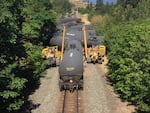
A train carrying crude oil derailed near the Columbia River Gorge town of Mosier, Oregon, in June 2016.
Emily Schwing / OPB
Oregon Senate President Peter Courtney introduced a bill Tuesday that would increase regulations for railroads carrying crude oil and other hazardous materials through the state.
The bill would give the Oregon Department of Environmental Quality the authority to regulate railroads carrying hazardous materials.
As OPB reported in June, that's a level of preparation the state currently doesn't have.
Rail companies would be required to submit plans to show how they would respond to a oil spill. Those plans would need state approval.
Bruce Gilles, who manages clean up and emergency response for DEQ, said railroads would also need to prove they can pay for a derailment.
"Washington state to our north and California to our south both have passed legislation that require railroads to submit plans in their states and to do drills and exercises similar to what this bill would accomplish," he said Tuesday.
In June, a Union Pacific derailed in Mosier, Oregon spilling 42,000 gallons of crude oil. It caused a massive fire that forced evacuations and left an oil sheen on the Columbia River.
Related: Oil Trains In The Northwest
“The bill would give DEQ some regulatory authority over railroads to require them to prepare oil spill contingency plans for instances such as Mosier so that the state agencies that respond to those incidents know what kind of resources are coming to the scene from the railroad and what resources we might need to bring to the table to assist in the response," Gilles said.
This is the second time Oregon lawmakers will consider this type of legislation.
A similar bill was introduced in 2015 by Rep. Barbara Smith Warner, but the railroad industry lobbied against it. Instead, lawmakers passed a bill aimed at training first responders.
Union Pacific was among the railroads that lobbied hard against Smith Warner's bill in 2015.
"Union Pacific met pro-actively with Sen. Courtney last week do discuss Senate Bill 7," said Justin Jacobs, a spokesman with Union Pacific. "We are currently reviewing the bill."
Currently, the DEQ has rules regulating marine vessels that carry hazardous materials, like crude oil. This bill would bring the state's rail industry in line, Gilles said.
Dan Serres is the conversation director with Columbia Riverkeepers, a nonprofit environmental group that opposes transporting oil-by-rail. He said this bill is "attempting to start catching up" to laws in California and Washington.
"We're going to be looking for ways to improve and strengthen this, of course, and to make this bill as strong as possible and as much as a disincentive to dangerous oil trains as possible," Serres said.
